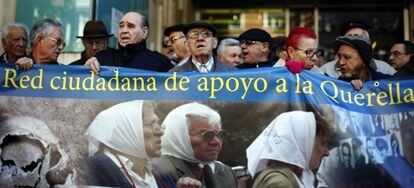Failed by Spain, the victims of Franco’s dictatorship seek universal justice
A group of Spaniards is hoping for legal redress in Argentina, before it's too late


The parents of Hilda Farfante, both teachers, were killed by Falangists on consecutive days in September 1936, at the onset of the Spanish Civil War. Seventy-seven years later, Hilda is seeking justice more than 10,000 kilometers from the scene of the crime, in Argentina. She was five years old when she was orphaned, and today she is one of 170 people and associations representing victims who filed a suit in Buenos Aires on April 14, 2010 against the crimes of the Franco regime: executions, torture, forced disappearances and stolen babies. More than three years after the suit was filed, and following a long period of lethargy, the proceedings have started to pick up pace.
On Monday, Buenos Aires Judge María Servini de Cubría heard testimony from Soledad Luque, who is looking for her twin brother, whom she claims was stolen at birth. On Thursday the judge met with three other plaintiffs and their lawyers, and set a November date for a new meeting with a Spanish delegation of plaintiffs and politicians. Joan Tardà, of the Catalan Republican Party (ERC), plans to travel to the Argentinean capital to add the case of Catalan premier Lluís Companys, who was executed in 1940, to the class action suit. "We can't let this train pass us by," he says. Other politicians who have expressed an interest in joining the cause are Joan Josep Nuet of the United Left coalition and José María Gorroño, mayor of Gernika, the Basque town whose bombing inspired Pablo Picasso to create his famous painting of the same name.
In Argentina, the speaker of Congress, the chair of the congressional human rights committee and eight other deputies recently signed a statement "supporting the legal proceedings" against Franco's crimes in their country and strongly rejecting "the crimes against humanity committed in Spain by the Franco dictatorship as well as the impunity that the people responsible for them have enjoyed."
On Tuesday, lawyer Carlos Slepoy was expected to ask the judge to set a date for a videoconference session with several of the victims, and to officially investigate nine former government officials under Franco's regime: three former ministers, one of whom, José Utrera Molina, is the father-in-law of current Justice Minister Alberto Ruiz-Gallardón; two judges; and four police officers.
The plaintiffs agree that they no longer expect any justice from Spain, which is why they are turning to Argentina, which is still holding trials over the crimes of its own dictatorship. For many of them, the Buenos Aires proceedings are the last stretch in a long race that's still being run 38 years after Franco's death.
"I filed a suit in Argentina because all the doors were closed on us in Spain and because I believe in universal justice," explains Hilda Farfante. I have believed in it ever since I saw [former investigating Judge Baltasar] Garzón issue an arrest warrant for [Chilean dictator Augusto] Pinochet," she explains. "I trust in that return trip: just like the grandmothers of Plaza de Mayo came to talk to Garzón one day," she says, in reference to when, 17 years ago, the Spanish judge opened a case against the Argentinean dictatorship. "Now we are going to Buenos Aires to talk to Servini de Cubría."
"My parents' murderers didn't even bother with a mock trial. I never found out where their bodies are. To me, justice after all this time means having a ruling in my hands explaining why they were killed, and so many others like them. And forcing the Spanish government to find them - that same government that hasn't even bothered counting them. I am hopeful, although I don't have much time left. If I don't get to see it, I hope my grandchildren will read that ruling."
On May 8, Fausto Canales crossed the threshold of the Argentinean consulate to testify in a videoconference with Judge Servini de Cubría. He was tremendously disappointed when, just as he was about to explain how a group of Falangists dragged his father out of bed early one morning in 1936 to kill him, the judge decided to postpone the videoconference. She herself admitted that her decision was caused by a call she received from the Argentinean ambassador, warning her about the Spanish government's "unease" with the proceedings.
Fausto had been waiting for this moment for 14 years. Ever since he retired in 1999, he has been exploring every archive in search of information about his father's last moments. He has knocked on all the doors of justice in Spain and Strasbourg, and learned with horror that in 1959, his father's remains were taken out of a mass grave and transferred without his family's permission to the Valley of the Fallen, a mausoleum outside Madrid where former dictator Francisco Franco lies buried.
"It was my aunts who told me about my father, because my mother would start crying every time someone mentioned his name. I already know that the person who killed him is dead. To me, justice would be for a judge to say that he was murdered undeservedly and to clear his name after so many of us had to live with the burden of people murmuring, 'He must have done something.' Only a judge can do that. A judge must say that my father was the victim of a forced disappearance and that those were crimes against humanity." He no longer expects anything from Spain, either. "The Argentinean suit is our last chance."










































